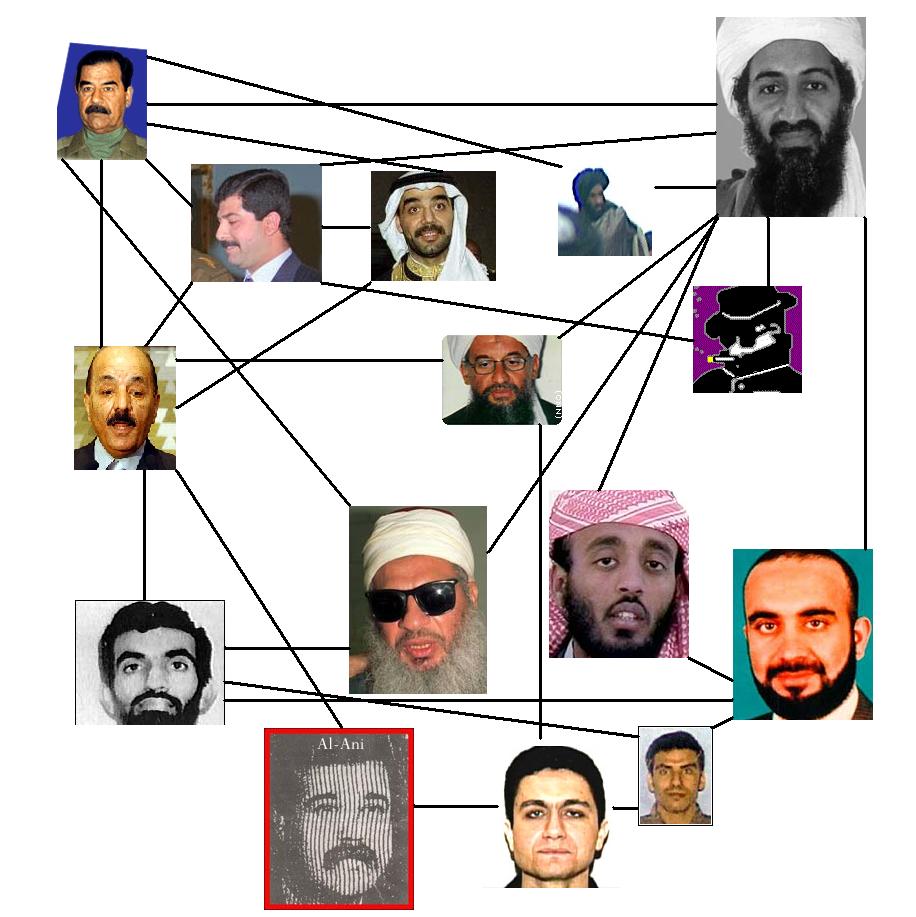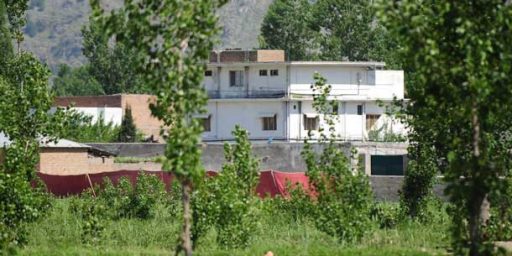Al Qaeda On The Brink Of Collapse?
Some U.S. officials believe that the assassination of Osama bin Laden has put al Qaeda on the ropes:
U.S. counterterrorism officials are increasingly convinced that the killing of Osama bin Laden and the toll of seven years of CIA drone strikes have pushed alQaeda to the brink of collapse.
The assessment reflects a widespread view at the CIA and other agencies that a relatively small number of additional blows could effectively extinguish the Pakistan-based organization that carried out the Sept. 11, 2001, terrorist attacks — an outcome that was seen as a distant prospect for much of the past decade.
U.S. officials said that al-Qaeda might yet rally and that even its demise would not end the terrorist threat, which is increasingly driven by radicalized individuals as well as aggressive affiliates. Indeed, officials said that al-Qaeda’s offshoot in Yemen is now seen as a greater counterterrorism challenge than the organization’s traditional base.
President Obama has steadily expanded the clandestine U.S. campaign against that Yemen group, most recently by approving the construction of a secret Persian Gulf airstrip for armed CIA drones. But recent setbacks, including a botched U.S. military airstrike on American-born radical cleric Anwar al-Aulaqi, underscore the difficulties that remain.
Nevertheless, the top U.S. national security officials now allude to a potential finish line in the fight against al-Qaeda, a notion they played down before bin Laden was killed by U.S. forces in a May 2 raid in Pakistan.
Defense Secretary Leon E. Panetta declared during a recent visit to Afghanistan that “we’re within reach of strategically defeating al-Qaeda.” The comment was dismissed by skeptics as an attempt to energize troops while defending the administration’s decision to wind down a decade-old war.
But senior U.S. officials from the CIA, the National Counterterrorism Center and other agencies have expressed similar views in classified intelligence reports and closed-door briefings on Capitol Hill, officials said.
“There is a swagger within the community right now for good reason,” said Sen. Saxby Chambliss (Ga.), the ranking Republican on the Senate intelligence committee.
“Al-Qaeda in the Arabian Peninsula is nowhere near defeat,” Chambliss said, referring to the Yemen-based affiliate. “But when it comes to al-Qaeda [core leadership in Pakistan], we have made the kind of strides that we need to make to be in a position of thinking we can win.”
Even those who winced at Panetta’s word choice agree with his broader observation. “I’m not sure I would have chosen ‘strategic defeat,’ ” said a senior U.S. counterterrorism official, who cautioned that even if al-Qaeda is dismantled, its militant ideology has spread and will remain a long-term threat.
“But if you mean that we have rendered them largely incapable of catastrophic attacks against the homeland, then I think Panetta is exactly right,” the official said, speaking on the condition of anonymity to discuss sensitive intelligence. “We are within reach of rendering them to that point.”
This is the kind of prediction that strikes me as being that’s just a little too optimistic. Rendering the old core al Qaeda in AfPak unable to threaten us is an accomplishment, I suppose but, in all honesty, they’ve been in that situation for years now, which is why attention in the War on Terror has shifted to places like Yemen, where groups affiliated with but independent of the “original” al Qaeda are still quite active. Moreover, it seems unlikely that al Qaeda elements in Pakistan will ever be completely defeated given that they clearly are being given protection by elements of the Pakistani government or military.
Of course, there are other ways to look at this story. Andrew Malcolm at the L.A. Times, for example, takes a cynical look at this anonymous leak in The Washington Post:
Our focus has nothing to do with the Post, one of the nation’s best news organizations, and its respected reporter. It has everything to do with how competitive traditional journalism is still practiced in the nation’s capitol by the best of them.
How government uses that competition and its control of information to shape public thinking to its will, especially in delicate political times like these. And how Americans can be better-informed, more wary consumers of political news.
The complete Post story here is typically well-crafted with even an over-abundance of professional caveats: “al Qaeda might yet rally” and “its demise would not end the terrorist threat.”
Adding: “Indeed, officials said that al Qaeda’s offshoot in Yemen is now seen as a greater counterterroism challenge than the organization’s traditional base” in Pakistan.
And then: “Even if al Qaeda is dismantled, its militant ideology has spread and will remain a long-term threat.”
What? Wait! What then exactly do these unidentified experts want us to feel like carefully celebrating in this summer when Obama’s Afghan troop drawdown is scheduled to begin?
Oh, that’s it. ‘Mission Accomplished’ without the banner. We’re not cutting and running from an endless conflict in a foresaken place that’s become the nation’s longest war ever and claimed 1,680 American lives, 1,050 of them under Commander-in-Chief Obama.
Apparent retreat would be a gift to Republicans in next year’s presidential campaign.
Better to frame it, ‘We’ve pretty much taken care of this crowd of bad guys and we can safely bring the boys and girls home.’ That would be good news for Obama, even if he wasn’t a Nobel Peace Prize winner with undeclared, ongoing military conflicts in Yemen and Libya.
It wouldn’t surprise me if there was some of this mentality going around Washington. It’s really just a modern spin on Nixon’s idea of declaring victory in Vietnam and going home and, given how our efforts in Afghanistan have gone lately, it’s probably the best strategy to undertake at this point. Whether its part of a conscious strategy or not, I don’t know, but it’s undeniable that a reduced threat from al Qaeda in AfPak makes our mission in Afghanistan seem far less relevant than it was a few years ago.






Win!
It’s tough to engage in terrorism when you’re a flaming pile of ash.
That said, al Qaeda still is quite dangerous. Not in a Tanzania or a USS Cole or a 9/11 sense, but dangerous nonetheless.
Hopefully the government doesn’t get complacent. That could get a lot of people killed. Literally.